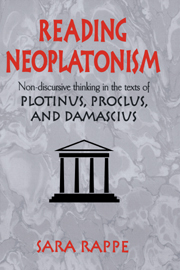Book contents
- Frontmatter
- Contents
- Preface: Discursive Strategies and Neoplatonic Texts
- Acknowledgments
- List of Abbreviations
- 1 Introduction. Representing a Tradition: Exegesis, Symbol, and Self-reflection
- PART I LANGUAGE IN THE ENNEADS
- PART TWO TEXT AND TRADITION IN NEOPLATONISM
- 6 History of an Enigma: Mathematical Symbolism in the Neoplatonic Tradition
- 7 Transmigrations of a Myth: Orphic Texts and Platonic Contexts
- 8 Language and Theurgy in Proclus' Platonic Theology
- 9 Damascius' Ineffable Discourse
- 10 Conclusion: Reading Neoplatonism
- References
- General Index
- Index Locorum
9 - Damascius' Ineffable Discourse
Published online by Cambridge University Press: 24 October 2009
- Frontmatter
- Contents
- Preface: Discursive Strategies and Neoplatonic Texts
- Acknowledgments
- List of Abbreviations
- 1 Introduction. Representing a Tradition: Exegesis, Symbol, and Self-reflection
- PART I LANGUAGE IN THE ENNEADS
- PART TWO TEXT AND TRADITION IN NEOPLATONISM
- 6 History of an Enigma: Mathematical Symbolism in the Neoplatonic Tradition
- 7 Transmigrations of a Myth: Orphic Texts and Platonic Contexts
- 8 Language and Theurgy in Proclus' Platonic Theology
- 9 Damascius' Ineffable Discourse
- 10 Conclusion: Reading Neoplatonism
- References
- General Index
- Index Locorum
Summary
Introduction to Damascius and the Aporiai kai Luseis Peri Proton Archon (Doubts and Solutions Concerning First Principles)
Damascius (ca. 462–538) was scholarch when the Christian emperor Justinian shut down the Platonic Academy in 529, issuing a decree that banned all pagans from teaching in Athens. Damascius' title, Diadochus, marked him as last in the ancient lineage of Platonic Successors. His attempts to revitalize the foundering school no doubt made it a target of anti-pagan persecution, a persecution that followed in the wake of violent attacks directed against Neoplatonists active in the city of Alexandria. Upon the closing of the Academy, Damascius led a band of pagan philosophers out of their patron city and into exile. We learn from the historian Agathias that
Damascius the Syrian, Simplicius the Silician, Eulamius the Phrygian, Priscian the Lydian, Hermeias and Diogenes from Phoenicia and Isidorus of Gaza, all the finest flower, as the poem says, of those who did philosophy in our time, since they did not like the prevailing opinion among the Greeks, and thought the Persian constitution to be far better… went away to a different and pure place with the intention of spending the rest of their lives there.
There is some disagreement about the fate of the exiled philosophers after their disappointment over conditions in Persia. It is now disputed that they settled at Haran and thereby transplanted a branch of the school into Near Eastern soil.
- Type
- Chapter
- Information
- Reading NeoplatonismNon-discursive Thinking in the Texts of Plotinus, Proclus, and Damascius, pp. 197 - 230Publisher: Cambridge University PressPrint publication year: 2000



